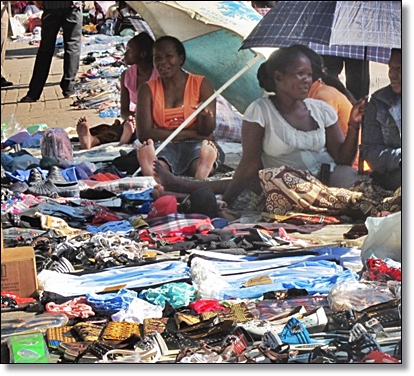Street Vendors: Villains or Entrepreneurs?
 |
I used to be angry with these people, angry because they make my walk miserable. I just wanted them to leave the city centre and go and sell somewhere. Whenever I saw the city council officials going after them and taking their stuff, I would think of them as being responsible, they were taking a part in retaining the city’s cleanliness and sure, those people should go somewhere. But where do they go and to whom should they sell to wherever they are to go? It then rang in my mind that it’s not the vendors’ fault that they are all over town, therefore we should not blame the vendor.
Everyday, I hear stories of people being retrenched, salaries being slashed, working days being reduced and people getting their salaries much later than expected. Just this other day, a local security company had to dismiss seventy workers. These seventy people have a number of dependants. This means seventy families have lost a source of income; more than seventy school children have been affected as next term they do not know where their school fees will come from. This is just from the security company I heard of, and not to speak of the other companies I am not familiar with that are also retrenching each and everyday.
This simply means that more free space in the CBD is going to be occupied by more‘vendors.’ They are going to find something to sell, maybe tomatoes, maybe cellphone accessories or toiletries, whatever they might find worth selling and has a probability of returning a reasonable profit.
Not all of those people we call vendors wanted to be where they are right now. It’s not that they are inferior to those who are not vendors, it is simply because they have families to sustain, children to send to school and stomachs to feed. That person we call a vendor is just a person trying to earn a living. As much as we don’t want them in the CBD, as much as we want them to be transferred somewhere, one thing we should remember is that they are just but people trying to make a living.
With people losing their jobs every day, the city centre will soon just be like Mbare Musika, where we find each and everything we can think of being sold in one place. Before we curse the vendors, before we intentionally step on their vegetables spread on the pavement, we should just remember that they are not doing this for fun or as a hobby, they are people trying to earn a living. I am thankful they are doing something to earn a living and at least they are not pick-pocketing.
We should see how hard most of those people work just to get a profit of a dollar, especially those who sell fruits and vegetables. They wake up very early to Mbare Musika to get fresh produce so as to sell. By the end of the day they would have reduced their prices abstemiously, with very little profit, selling at a loss because they just need bus-fare and something to eat the following day. As greedy as many of us are, we always try to persuade them to reduce their prices for us which is quite unfair as most of the time they sell at a loss so that their stuff is sold.
We shouldn’t think ourselves better than the vendors, we never know what tomorrow holds for us. No one went to the streets willingly, circumstances forced them to do so. A number of them have their degrees, courses and all but because most companies are not recruiting until ‘further notice’, they are left with no choice but to be vendors. We can only hope for a better tomorrow.
By Ivy Chibanda
The author is a young feminist, currently studying media and society studies at Midlands State University.
